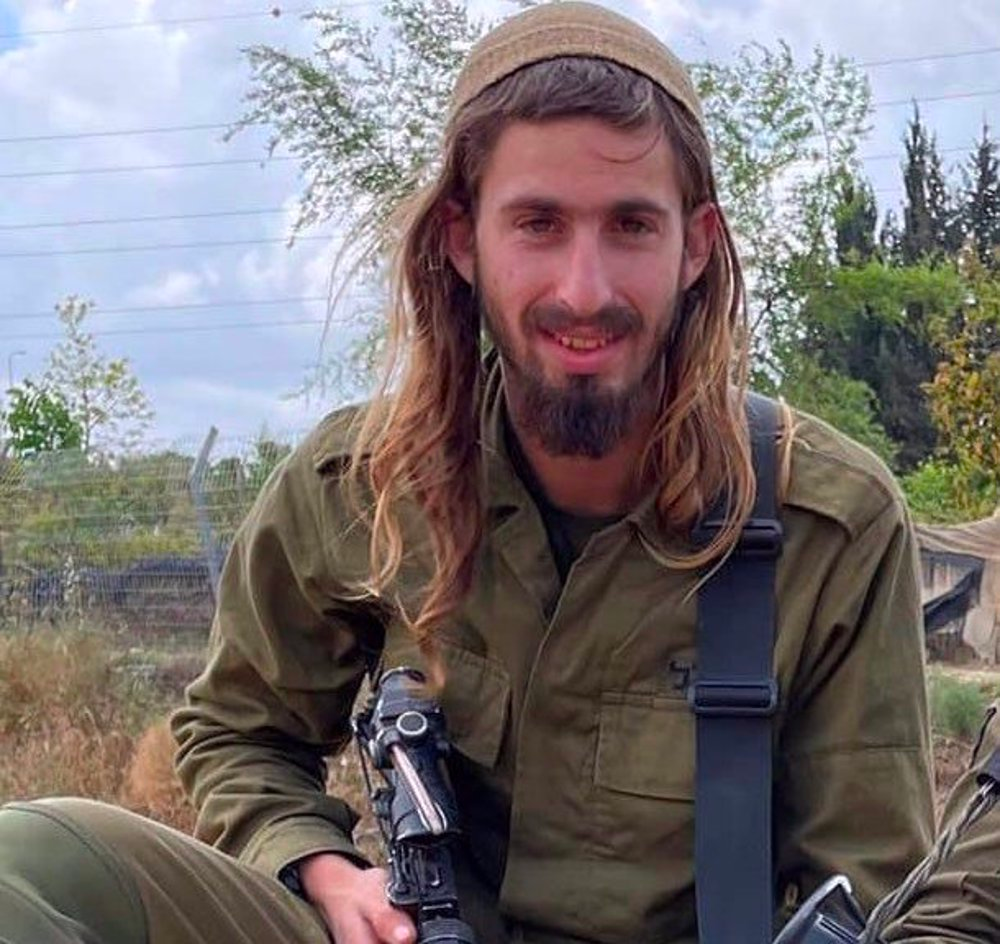
Shuva'el Ben Natan, an Israeli reservist, who was killed in southern Lebanon last week. He also participated in the burning of several Palestinian villages, destroying homes and vehicles in the occupied region, according to eyewitness reports.
By Alireza Akbari
Shuva'el Ben Natan, an Israeli reservist involved in the killings of Palestinians in Gaza and the occupied West Bank for years, was neutralized during combat in southern Lebanon last week.
He had been dispatched to southern Lebanon from Gaza after the Israeli regime announced the “ground invasion” of southern Lebanon recently, which has proved a complete disaster for the regime.
After failing to achieve its key military objectives in the Gaza Strip after one year of genocidal war that has claimed nearly 43,300 lives so far, the Israeli regime ordered a “ground invasion” of southern Lebanon early last month despite warnings from the Lebanese resistance movement Hezbollah.
Despite its attempts, the Tel Aviv regime has not succeeded in breaching the Lebanese border, facing strong resilience from the Lebanese-based resistance Hezbollah.
According to Israeli media, including Yedioth Ahronoth, around 50,000 Israeli troops as part of five military divisions and reserve brigades have failed to occupy even one Lebanese village or town in more than a month while losing hundreds of soldiers to Lebanese resistance operations in the process.
One of them is Ben Natan, who had the blood of many Palestinian children on his hands.
Just after the Israeli regime launched its genocidal war against Palestinians in Gaza in October last year, a hate-spewing military reservist killed 40-year-old Bilal Salah, a Palestinian olive harvester in the village of Sawiya, located south of Nablus in the occupied West Bank.
After that, he was deployed to the besieged coastal Palestinian territory at a time when hospitals and schools were being indiscriminately bombarded and civilians killed in cold blood in broad daylight.
He engaged in horrendous war crimes in Gaza, where he was involved in setting fire to homes and killing Palestinians, including women and children, without regard for human life.
The extent of his brutality became alarmingly evident during his funeral, where his brother Uriyah and friends openly recounted his war crimes and expressed a desire for "revenge."
Their speeches were subsequently interpreted as explicit admissions of the slain reservist’s heinous atrocities committed against Palestinian civilians, emphasizing his direct involvement in war crimes.
This disturbing portrayal garnered widespread attention as the video of the funeral circulated online, igniting outrage and condemnation among netizens.
During Ben Natan's funeral, his brother Uriyah delivered a eulogy that shocked many in attendance. "You entered Gaza to revenge as much as possible, women, children, everyone you saw, as many people as possible, that’s what you wanted,” he exclaimed, referring to his brother’s main motive.
“And on this day, a year after Simchat Torah, when we thought we would massacre the enemy, massacre them all, drive them out of the land, we are here at your funeral…the entire nation of Israel will have the opportunity to avenge your revenge, blood revenge, not the revenge of burning houses, not the revenge of burning trees, not the revenge of burning cars, but the revenge of blood you spilt.”
Uriyah’s words laid bare the chilling extent to which the concept of “massacre” has taken root in the mindset of Israeli settlers, reflecting a deeply ingrained ideology that glorifies violence and vengeance.
Ben Natan's father also mourned his son by reminiscing about their shared experiences, recalling how they would patrol together while shooting at Palestinians who threw stones, describing their aim to “control and blow them up from a distance.”
During the eulogy that further exposed Ben Natan's war crimes, an Israeli soldier referenced Ben Natan, saying, “You were the happiest and most optimistic and frivolous person in the platoon. We saw it for the first time in Gaza when you unauthorizedly burnt a house just to lift the atmosphere.”
The statement not only highlighted Ben Natan's barbaric behavior but also underscored the normalization of violence within Israeli military circles as well as the settler population.
Ben Natan’s barbaric mindset, exposed during his funeral, sheds light on his affiliations with the Hilltop Youth which is a far-right Jewish settler movement in the occupied West Bank led by Israeli minister Itamar Ben-Gvir.
This group is recognized as one of the most radical factions associated with Israeli settler extremism.
Emerging in the early 2000s, the Hilltop Youth is a loosely organized collective primarily composed of young, extremist Israeli settlers who are driven by the belief that establishing illegal outposts on the forcibly seized Palestinian land is a religious obligation. The group's ideology revolves around expanding Jewish presence in the occupied West Bank, an initiative aimed at fulfilling their aspiration for a "Greater Israel."
Their activities are marked by violent attacks against Palestinian civilians, destruction of property, and instances of verbal harassment, contributing to the ongoing cycle of tension and conflict in the region.
In a poignant reflection on Ben Natan’s funeral, Lebanese Islamic scholar Sayyid Hussain Makke took to X (formerly Twitter) to express a powerful sentiment. He emphasized that, despite the immense suffering endured by him and many others in Lebanon amid the ongoing massacres, there is no desire for "revenge" against Israeli women and children.
“Despite having lost so many loved ones, and despite my father being abducted by Israel as a teenager, and despite all the suffering inflicted upon us personally since I was born, and despite being displaced with my family right now and after having our whole village destroyed - neither I nor anyone I know has ever wished 'revenge' on Israeli women and children,” he wrote.
His remarks highlighted a stark contrast to the narratives perpetuated by settlers’ extremist ideology.

